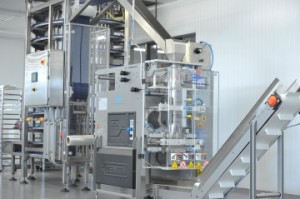
Pack to school basics [from Canadian Packaging October 2012 issue]
By Andrew Joseph, Features Editor; Cole Garside, Photographer
General Abbey Packaging Equipment Ltd Canadian community college programs college degrees Conestoga College packaging machine operator school packaging school Quadro Engineering Tri-Mach GroupCanadian college sets out to create the next generation of high-skill food-processing operators to safeguard the industry’s future growth prospects
As one of Canada’s largest manufacturing industries, food processing has long been a vital cog in the country’s economic engine—generating a healthy contribution to the country’s employment growth, exporting opportunities, and overall national economic prosperity. Employing an estimated 300,000 Canadians, about 1.7 per cent of the total workforce, the sector supplies nearly 80 per cent of all the processed foods and beverages retailing in Canada at any one time, according to industry statistics.
For all that, there is no getting around the fact that Canada’s food manufacturing industry is faced with the challenge of improving its competitiveness in the global market in a big way in coming years, which is unlikely to happen without a meaningful infusion of new human resources and talent armed with the right skillsets and technical know-how to fill the many important jobs and positions that often go begging—due to the puzzling lack of qualified candidates.
Which is exactly the labor market riddle that folks at the Kitchener, Ont.-based Conestoga College Institute of Technology and Advanced Learning have set out to resolve in a big way with the recent opening of the school’s Institute of Food Processing Technology (IFPT) center—located at the school’s satellite campus in the nearby city of Cambridge.
While the fledgling new program is only in its second year of existence, it has already attracted solid backing and support from influential institutions like the Alliance of Ontario Food Processors, Ontario Ministry of Agriculture, Food and Rural Affairs (OMAFRA), Food Processing Human Resources Council, and other organizations with a vested interest in seeing the college succeed in developing new training tools and competencies to lift the critically-important food processing sector to new heights.
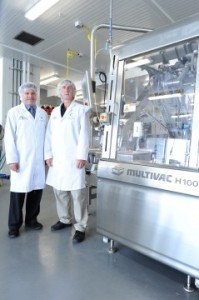
Institute of Food Processing Technology’s chair Luis Garcia (left) and technologist Barry Bremner pose beside the Multivac H100 pick-and-place robotic packer.
“The Alliance of Food Processors was actually the industry group that conceived the idea of this program,” explains IFPT chair Luis Garcia. “Its members got involved with the concept right away and pushed the idea along to make it a reality.
“The bottom line is that we all want to make it easier for well-trained individuals to get a job in the industry,” says Garcia, describing IFPT’s intensive, two-year training program—the only one of its kind in Canada—that will turn out properly-trained food-processing technicians ready to take on and conquer the many day-to-day challenges of the fiercely competitive global food-processing industries.
Skill Shortage
Says Garcia: “Our industry acknowledges that there is a lack of skilled employees available for our workforce, which is why companies always seem to have positions available for people who have the appropriate abilities and training.
“Alas, many companies just aren’t able to find the qualified people they really need, which is really a major problem for all Canadian industries in general.
“And that is where the IFPT program is designed to help the industry out,” Garcia told Canadian Packaging during a recent visit to the new 260,000-square-foot LEED (Leadership in Energy and Environmental Design) silver-certified building where the IFPT offers part-time adult education in advanced sanitation, and food-processing supervisor skill and food safety training—on top of its full-time co-op food processing technician and food processing techniques programs.
In addition, IFPT administers an apprenticeship program for aspiring food manufacturing process operators—delivered as a combination of online and in-class sessions with extensive complementary hands-on experience.
“The IFPT opened its doors to students in September of 2011 with six students,” recalls Garcia.
“This year we already have 13 students, and the eventual goal is to be enrolling 24 new full-time students per year,” says Garcia, estimating that there are well over 3,000 food-and-beverage producers operating in the province of Ontario alone.
“The food-processing industry is always in need of highly-skilled workers, and that is exactly what we are going to provide,” says Garcia, pointing out that the college’s three-level process operator apprenticeship program comprises 300 hours of in-class instruction and 4,000 apprenticeship hours supervised by qualified industry professionals.
“Our focus is to provide a skilled equipment operator and maintenance staff employee,” Garcia explains, “which is why we teach both mechanical and electrical theory in combination with hands-on application and extensive food-testing training.
“We want our students to really appreciate the importance of product quality testing in the food industry,” he says, “even if its something they will not have to perform after they enter the workforce.”
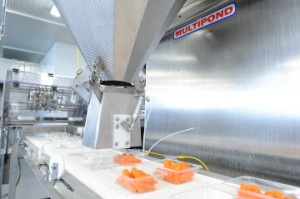
After a Graphics Packaging International denester places trays onto a conveyor, fresh-cut carrots are placed into the trays by a Multipond 12-head weigher installed by Abbey Packaging Equipment.
To attract bright students into the program, Conestoga College made a substantial $5-million capital investment to equip the new pilot plant with the highest-quality processing and packaging line equipment available, Garcia relates, with both the provincial and federal government chipping in to get the project rolling.
Best Buy
“To give our students the best hands-on experience possible, we purchased components to construct a bakery line, a beverage/pasteurization bottling line, and a fresh vegetable line,” says Garcia.
“A bid for proposals was placed on a government website requesting the installation of a full line,” relates IFPT technologist Barry Bremner, saying that the winning bid submitted by the Elmira, Ont.-based engineering services provider Tri-Mach Group Inc. specified the best way to purchase, install and commission the pilot-plant’s fresh-vegetable line.
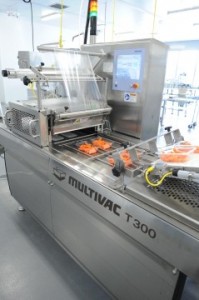
A compact, fully-automatic Multivac T300 tray-sealer combines innovative machine technology with a hygienic design to provide IFPT students with an excellent learning platform to hone their food process operating skills.
Working closely with a group of suppliers selected from an intensive bidding process, Tri-Mach proceeded to assemble and integrate the pilot plant’s fresh vegetable line with an array of new equipment, including:
- a Nilma vegetable peeler, powered by a Bonfiglioli motor;
- a Kronen GS10 slicer and VG010 washer;
- a Multivac T300 tray-sealer and model MR 6411 labeler;
- a plastic tray denester from Graphic Packaging International;
- a Multipond LW1201-B 12-head portable combination weigher;
- a Multivac H100 pick-and-place robot;
- a Mettler-Toledo checkweigher;
- an S+S Inspection metal detection system;
- Tri-Mach-made sorting tables and custom-designed ‘everclean’ conveyors;
- a Schneider Electric Magelis HMI (human-machine interface) that controls the conveyor system under the Multipond.
“If this all seems like a lot of equipment or even overkill—it’s not,” Garcia asserts.
“It’s pretty much what any standard fresh-produce line is going to encompass equipment-wise, and we want to ensure students get a proper education here,” says Garcia, reserving special praise to the Burlington, Ont.-based Multipond distributor Abbey Packaging Equipment Ltd. for facilitating and managing the Multipond weighing and portioning equipment that could handle portioned fresh vegetables like carrots, onions, potatoes., etc., as specified by Tri-Mach.
“We have dealt with hundreds of suppliers on this undertaking, and working with Abbey Packaging was really a great experience,” extols Bremner.
“It became very apparent that Abbey Packaging was a great choice—the flawless equipment, a superb training professional, and an easy-to-work-with team made the whole experience a good one,” he says, recalling that Abbey Packaging’s service technician was right there on the spot when the Multipond system was first started up.
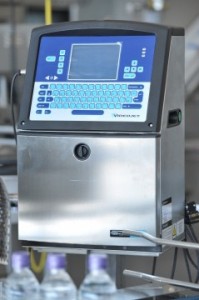
A Videojet 1220 small-character inkjet printer used to print lot and best-before codes onto bottling line containers.
Perfect Start
“It ran perfectly from the onset,” explains Bremner, “but the service tech believed it could run even better, and spent the better part of the day making it happen.”
According to Bremner, the Abbey Packaging technician discovered that the servomotor-driven distribution can that delivers product to the 12 weighscales was better suited for harder-to-move products, and suggested installing a vibratory unit and trays would facilitate better movement for the non-leafy products.
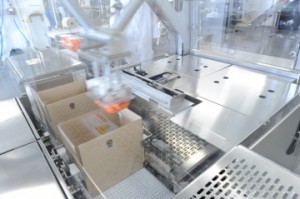
The Multivac H100 case-packer uses pick-and-place robotics to pack finished trays into corrugated cartons.
“Their technician installed the new equipment, added the vibration electronics controls, software and wiring,” recounts Bremner. “But unlike with many other suppliers, there was no work-order, change notice, invoice or restocking charges.
“They just wanted to make sure their equipment was working perfectly for the customer—a concept which seems to have become forgotten in the world of engineered solutions,” Bremner remarks.

A pair of high-quality Tagliavini Rotovent model ovens and proofers/retarders designed for compact size, versatility and energy savings are employed in the IFPT’s bakery.
As pleased as they are with the fresh-vegetable line, Bremner and Garcia are also justifiably proud of the impressive baked goods line at the pilot plant, featuring:
- planetary and spiral mixers supplied by Globe Equipment and Abrigo Industrial Machines, respectively;
- a Vemag PC878 model portioner from Reiser;
- a Konig Harvest bun-maker and MiniRex Futura portioner;
- indexing and retracting conveyors supplied by Tri-Mach;
- two Tagliavini Rotovent TVT 665E model ovens and a double retarder proofer;
- a spiral conveyor from Tri-Mach, controlled via a Magelis HMI terminal, used for cooling the fresh-baked product;
- a Zenith form/fill/seal vertical bagger, manufactured by PFM Packaging Machinery Corp.
For its part, the pilot plant’s bottling line consists of:
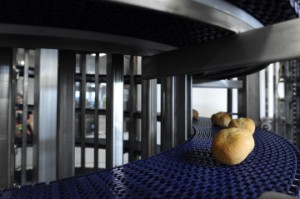
Freshly-made buns baked by IFPT students cool down as they move along the Tri-Mach spiral conveyor for packing.
- liquid mixing and dispersion equipment supplied by Quadro Engineering, IKA Works, Silverson, Viking Canada, Idex, Highland Equipment and Stainless Process;
- an UHT (ultra-high temperature) SPX pasteurizer that heats up and chills product in a few seconds;
- an Accutek Packaging Equipment bottle unscrambler and bottle rinser;
- an SPX aseptic tank with a Magelis HMI;
- a trayformer and a rotary bottle-filler capable of running at 60 bottles per minute, manufactured by Biner Ellison High Speed Packaging Machinery, outfitted with a Delta Electronics HMI;
- plastic bottles donated by Lassonde Beverages Canada;
- bottle caps donated by Pano Caps;
- a Pillar Technologies capper capable of utilizing twistoff caps or caps outfitted with induction safety seals;
- Tri-Mach conveyors;
- a self-adhesive label-applicating system from Labelette;
- an Aesus Systems heat tunnel and shrinksleeving equipment to apply full-body film wrap and/or tamper-evident neck bands, featuring a Rockwell Automation Allen-Bradley PanelView C300 control terminal;
- a small-character Videojet 1220 inkjet printer and a P3400 label printer;
- corrugated cartons supplied by Integrated Packaging Systems;
- a Phase Fire Shrink Technologies shrinkwrap and heat tunnel.
Win-Win
“Equally important to learning how to operate a food processing line is the clean-up and sanitation issues that surround it,” explains Garcia, “which is why we offer a strong course on this subject.”
Garcia mentions that the IFPT has achieved a win-win partnership with Sani-Marc Group, who provide chemical products and technical assistance to the school in exchange for being allowed to schedule R&D (research & development) time in the facility, along with training for their clients.
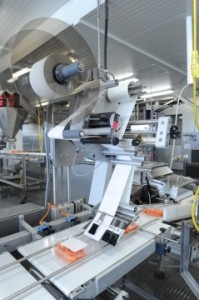
A Multivac MR 6411 labeler applies adhesive labels onto tray of carrots on the fresh-vegetable packaging line.
As well, the facility also boasts a Qualtech CIP (clean-in-place) system that is used to sanitize the preparation equipment, filler, UHT and septic tanks.
“In addition, we have a COP (clean-out-of-place) tank and all the equipment necessary to effectively clean and sanitize conveyors, floors, walls and ceilings,” says Garcia. “We use foaming and gelling technologies that are proven to be more effective both from a cleaning and a cost point of view.”
Bremner points out that IFPT also has a liquid process training system—a large, hands-on workboard—supplied by fluid control experts Bürkert featuring Siemens‘ Simatic Panel Touch HMI that allows the students to design and build an automated efficient set up of a liquid process line.

A Vemag PC878 portion controller from Reiser is used by IFPT students to prepare the fresh-baked goods for packaging.
Auto Pilot
Says Bremner: “We have had some very good suppliers and contributors as we built the pilot plant.
“Working with Abbey Packaging was an absolute pleasure, as they provided the right equipment, the right service and expertise and a commitment to make it perfectly fit our requirements,” he adds.
Aside from the mechanical and electrical knowledge imparted to each student, Garcia is adamant that the IFPT program teach them something equally as important.

A Siemens S7-200 CN PLC control (left) and a pair of Schneider Electric’s 240 VDC inductive sensors controlling the UHT (ultra-high temperature) pasteurizing line.
“You can have all the knowledge in the world, but if you are unable to work as part of a team, your career in this industry will be short-lived,” relates Garcia.
“We teach teamwork, as workers should be conscious of the entire production line and be in agreement to the best operating solution that won’t impact the overall quality, safety or productivity of the line.”
Sums up Garcia: “We don’t want to produce graduates simply to be part of a business: We want our graduates to help that business grow!”
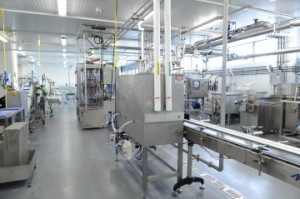
Two of the three food process packaging lines at the IFPT pilot plant include the fresh-vegetable line (left) and the bottling line (center), with clean-up and sanitation equipment strategically positioned nearby on the right to provide students with a real-life food-processing production environment.
Advertisement


